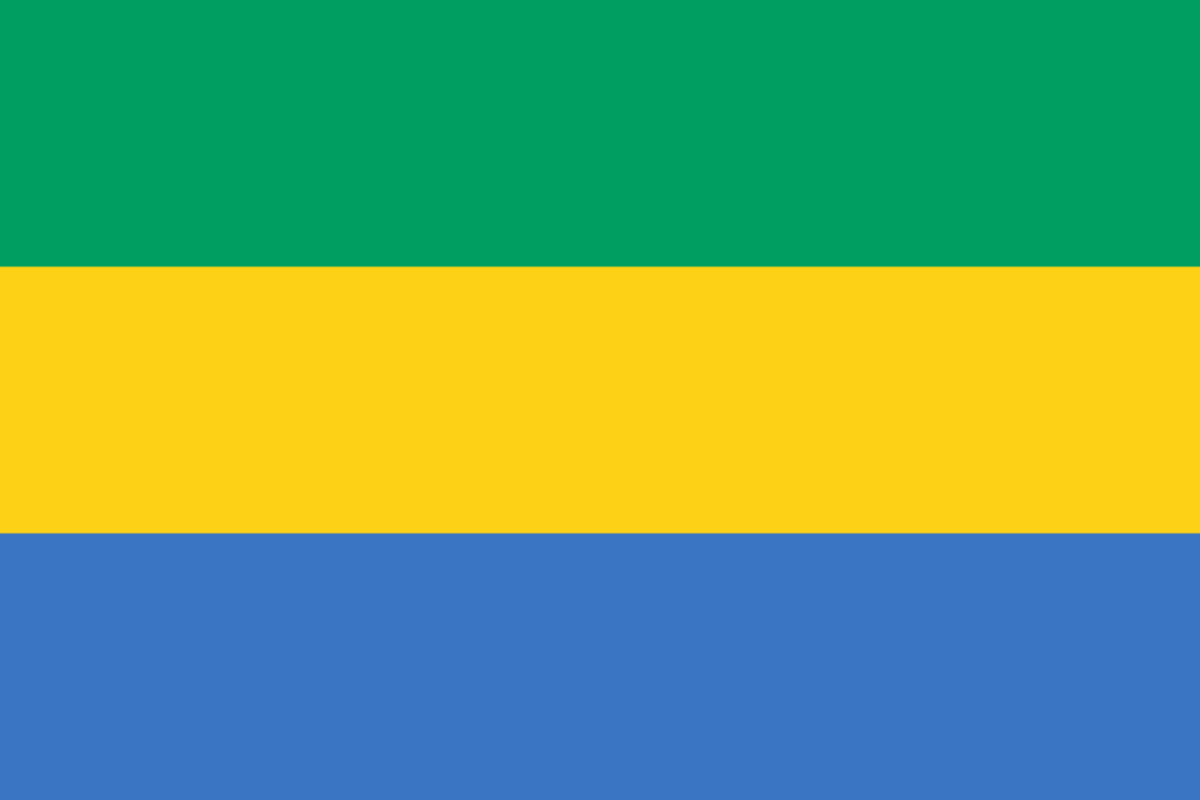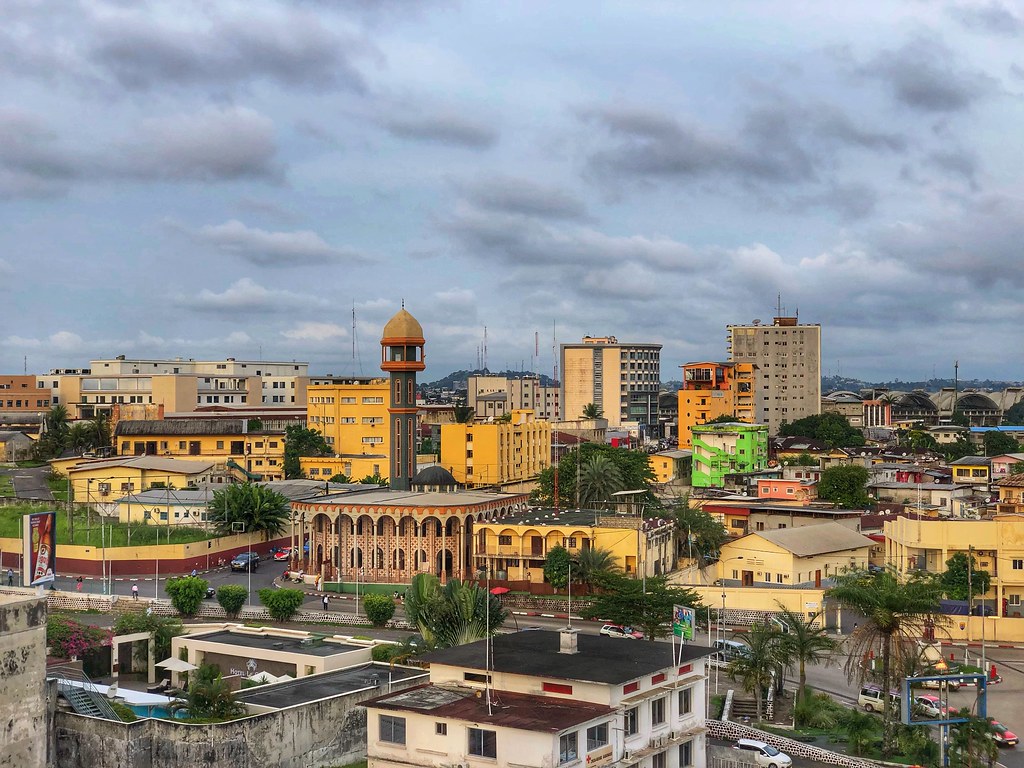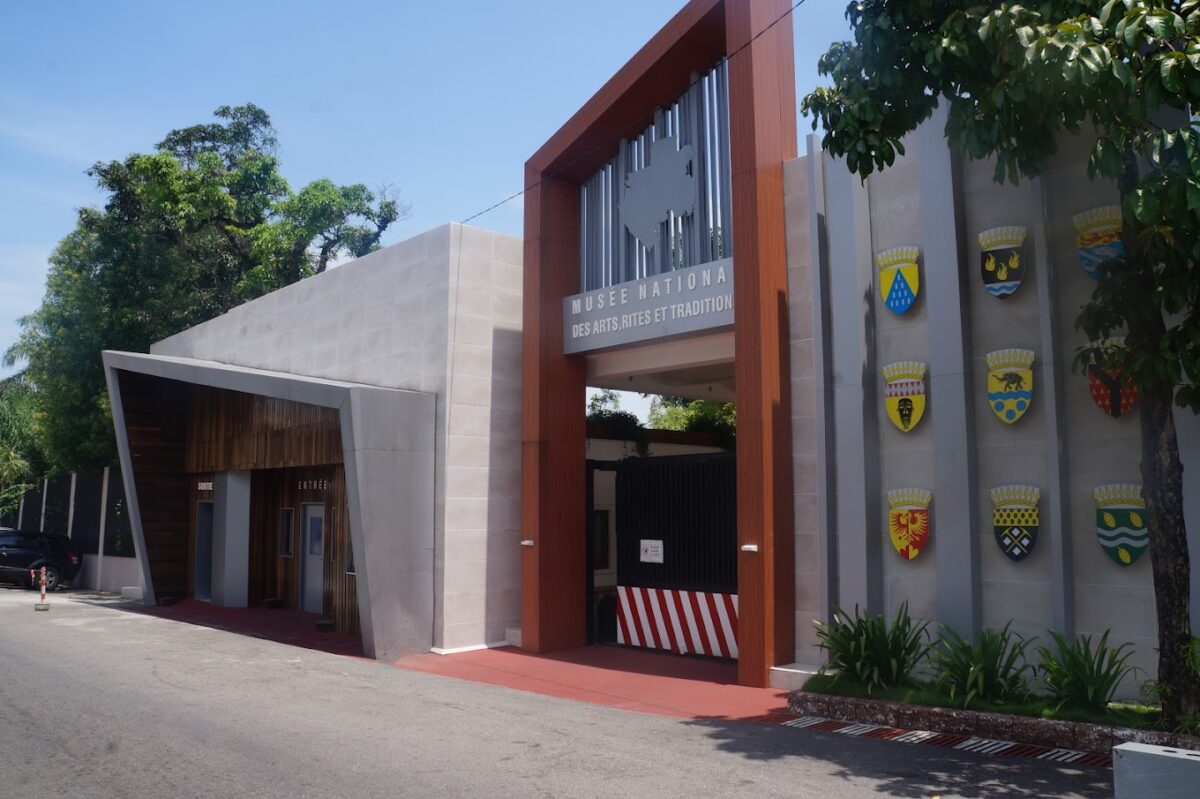Gabon

Capital City: Liberville
Population: 2,340,613 (2022)
Land Area: 267,667 sqkm
Official Languages: French
Legal System: Civil Law
Time Zone: GMT+1
Currency: Central African Franc (CFA)
GDP: 18.3 billion USD (2021 est.)
Main industries: Oil production, timbre/wood, palm oil processing, minerals, agro-processing.
Principal exports: Crude petroleum, refined petroleum, ores/slag, wood and articles thereof, veneer sheets.
Due to Gabon’s biodiversity, it has set up many national parks, the most notable of which is the Lopé National Park and its associated archaeological sites, located in the centre of the country, that comprise the Ecosystem and Relict Cultural Landscape of Lopé-Okanda which is a UNESCO World Heritage site. Gabon has three distinctive regions; the coastal area, with the capital of Libreville located on the northern shore of the Gabon Estuary, is made up of lowlands of beaches and lagoons bound by mangrove swamps and dense forestry that leads inland towards an elevated and broad series of granite plateaus. The second region found further inwards beyond the plateau consists of rolling hills, more forestry and mountains that reach up to as high as 5,000 feet, offering diverse and scenic beauty. And the third region consists of scattered and expansive savannas towards the southeast side of the country although some may be found in the central region as well; additionally, the country also has hundreds of caves across the eastern and central regions, made of limestone and dolomite. The Ogooué River, some 1200 km long, cuts through all three regions of Gabon and is the principal river and largest drainage source for the country; the smaller rivers spread across the territory, including Nyanga, Ngounie, Okano and Sebe, all originate from the Ogooué River.

Gabon’s population is pegged at 2,340,613 as of 2022. 80.1% of Gabon’s population is Gabonese-born of which 23.2% are from the Bantu-Fang people, 18.9% are the Shira-Punu, 11.3% are Nzabi-Duma, 6.9% are the Mbede-Teke, 5% are Myene, 4.9% are Kota-Kele, 2.1% are the Okande-Tsogo, 0.3% are the Pygmy people and the remaining are from other smaller tribes. The non-Gabonese population makes up the remaining population of which 4.6% are Cameroonian, 2.4% are Malian, 2.4% Beninese, 1.6% Togolese, 1.1% Senegalese, 1% Congolese whilst the remaining 7.6% are Nigerian, Equatorial Guinean and other ethnicities from around the world that have acquired Gabonese nationality.
French is the official language of Gabon, spoken by about 80% of the population. Fang, Myene, Nzebi, Bapounou/Eschira, and Bandjabi are also spoken by the Gabonese people with Fang being the second most spoken language after French. Christianity is the religion of the majority of both countries; in Gabon, 42.3% of the nation practices Roman Catholicism, 12.3% practice Protestantism while 27.4% practice other denominations of Christianity. Almost 10% of the population practices Islam whilst the remainder of the population’s practices are unknown. Gabon has a youthful population with about 60% of the population under the age of 25 and the nation has amongst the highest urbanisation rates on the continent with 90.7% of citizens living in cities.
History
Traces of human activity dating back to the Stone Age have been found in the southern Moyen-Ogooué region of Gabon from which archaeologists have learnt that Pygmies were the first to inhabit its forests. They lived peacefully as a community of hunters and fishers for many decades on the island until the arrival of Bantu groups somewhere in the early 14th century. These migrating Bantu tribes had arrived after having fled from North Africa and on their journey south they intermixed with the different peoples they found and in some cases, such as in the case of the Pygmies, displaced other communities. Consequent to their actions, the Pygmies fled to the far eastern jungle regions where they reside till this day. Subsequently, more ethnic groups began to discover and settle on the island; in the 16th century the Bakélé, Simba, Mitsogho, Okandé and Bakota arrived along the Ivindo valley and then the Eshira, Bapunu, Balumbu then M’Bédé, Bandjabi, Bat-sangui and Aduma arrived from the southeast and eventually the Fang arrived during the 19th century.
The first European expedition arrived during the 15th century that carried Portuguese traders that named the country based on the Portuguese word gabao, referring to a coat with a sleeve and hood, the shape of which resembles the outline of the Komo River estuary. The Dutch, English and French explorers soon followed suit and arrived to the island also during the 16th century, largely to trade cloth, iron goods, firearms and alcoholic beverages in exchange for labour, hardwoods, ivory and other such precious items. By the beginning of the 1800s, the British had established themselves as the predominant traders in the Gulf of Guinea which spurred the French to step up and match the commercial competition. In a bid to gain more control, French Admiral Capt. Édouard Bouët-Willaumez, negotiated treaties with King Denis of the dominant Mpongwe clan on the southern end of the estuary in 1839 and then King Louise of the northern Mpongwe clan in 1841 which ultimately led to French sovereignty over their jurisdiction. Similarly, when American missions from New England arrived to the northern banks in May 1842 and established a school in King Glass, which happened to be the commercial centre on the land for the British, American and German forces, the French established Fort d’Aumale in King Louis in 1843; a year after, the French also imported Catholic missionaries to spread French cultural influence. Throughout the next six decades, the French continued to expand their influence throughout the territory of present-day Gabon, sending explorers such as Pierre Savorgnan de Brazza to establish French authority on the upper Ogooué and the Loango coast. In 1886, Brazza incorporated the French spheres of influence under the French Congo for which he became the governor. By 1910, virtually all of Gabon has become one of the four colonies in the federation of French Equatorial Africa with little political opposition but intense friction due to the disruptions in trade, labour taxes and monopolistic concessionary companies.
After the World Wars, a pro-French anti-colonialist elite arose which was comprised of graduates of the schools of the Brothers of Saint-Gabriel from Liberville and Lambaréné. When Gabon became an overseas territory with its own seats and representation in the French Parliament during the time of the Fourth French Republic, these individuals became the leading politicians that advocated for independence. Their efforts led to Gabon becoming an autonomous republic within the French Community; during this time plentiful public investment was directed into the Gabonese economy, healthcare and education systems. After cooperation agreements with France were officially ratified, Gabon achieved independence on 17 August, 1960. At the time of existence, two notable political parties came to the fore, the Bloc Democratique Gabonais (BDG) led by Leon M’Ba, and the Union Democratique et Sociale Gabonaise (UDSG) which was led by J. H. Aubame. Because neither party was able to secure a majority in the first post-independence election, legislative deputies gave a vote to decide who would take up the position of prime minister and since Leon M’BA won three of four votes he became Gabon’s first prime minister.
Key Dates
1470 Portuguese make landfall in the territory of Gabon
1839 Local Mpongwe ruler agrees to concede administrative rights to the French
1910 Gabon assimilated into French Equatorial Africa.
1958 Majority vote in Gabon to become autonomous republic within the French Community
1960 Gabon becomes an independent nation on 17 August
1961 Leon M’ Ba elected first president of Gabon
1967 Albert-Bernard Bongo succeeds M’Ba
1973 President Bongo converts to Islam and assumes the name Omar
1991 Parliament adopts new multi-party system constitution

Legal System and Government
Gabon is a presidential republic and instates the President as the Chief of State and the Prime Minister as the head of government with the latter appointed by the former. The president is elected by a simple majority vote for a 7-year term, without any limits on term renewals, and the prime minister is responsible for appointing the Cabinet in consultation with the president.
Gabon’s Legislative branch comprises a bicameral Parliament with the Senate having 102 seats for candidates that serve 6-year terms and are indirectly elected by an absolute majority vote through municipal councils and departmental assemblies. The National Assembly consists of 143 seats for a term of 5 years and members are elected in single-seat constituencies via an absolute majority vote that could go on for 2 rounds in the case of a tie of votes.
Economy
Gabon is an upper-middle-income country abundant in natural resources and said to be the 23rd largest economy in Africa in terms of nominal GDP. According to 2020 estimates, the country is the fourth-largest producer of oil in Sub-Saharan Africa, the world’s fourth-largest producer of manganese (largest reserves worldwide) and one of the world’s largest producers of tropical timbre.
After experiencing a plunge in GDP due to the pandemic which caused a drop to -1.8% growth in 2020, Gabon is slowly recovering as analysts predict that the GDP growth will be back to pre-pandemic levels at a growth rate of 3.7% in 2022 (compared to 3.9% in 2019). The upsurge in GDP growth and economic recovery can be attributed to the rise in oil prices and the gradual increase in Gabon’s oil production after it plummeted in 2020. Aside from oil exports, which account for approximately 45% of the nation’s GDP and 80% of its exports, Gabon’s 9.8% increase in manganese production, 120% increase in palm oil production and 29.8% increase in timbre wood production were also drivers of its economic rebound.
The value-added industrial sector (including construction) accounts for 47.8% of GDP of which manufacturing comprises 21% and mining 6%. These trends are set to increase as the Gabonese government is actively looking for economic diversification to decrease reliance on oil as part of the Gabon Strategic Plan 2010-2025. Agriculture, forestry and fishing are also a focus under this plan as it employs approximately one-third of the population but only generate, when products are value-added, 6.3% of the GDP due to the max exodus of people, especially the youth, towards urban areas in search for better employment opportunities. Gabon’s services sector, including value-added services used in the industrial and agricultural sectors, contributes 41.5% of GDP, of which the currently-developing tourism industry contributes 3% to GDP.
Trade
In 2021, Gabon’s GDP was recorded to be US$18.3 billion. The nation’s top exports for the year were predominantly comprised of mineral fuels, mineral oils and the products of their distillation (63.7%); other notable exports for the year were ores, slag and ash (23.0%) and wood and articles of wood (9.9%). These commodities were largely exported to the United States (58.6%), China (8.1%), Spain (5.2%) and France (4.6%). Meanwhile, Gabon’s top imports for 2021 comprised of machinery, mechanical appliances, nuclear reactors, boilers and parts thereof (14.3%), electrical machinery and equipment (8.2%), meat and edible meat offal (7.6%) and vehicles other than tramway/railway rolling stock (5.1). These imports were mainly procured from France (33.0%), Belgium (15.4%), the United States (7.1%) and Italy (5.3%).
Gabon is a member of the Economic and Monetary Community of Central Africa (CEMAC), the International Organisation of La Francophonie (OIF) and has bilateral trade agreements with Belgium, Luxembourg, China, Egypt, France, Germany, Italy, Lebanon, Mali, Morocco, Portugal, São Tomé and Principe, South Africa, Spain, and Turkey.
Investment Opportunities
The government of Gabon has been focusing on developing the nation’s economy through its Plan Stratégique Gabon Emergent; established in 2010, the Plan outlines ways to transform Gabon into an emerging economy and internationally competitive destination for investment by 2025. The nation is increasingly prioritising public-private partnership to modernise infrastructure and enhance human capital, examples of such initiatives including the agricultural programme GRAINE which aims to increase self-sufficiency in food production and establish new oil palm plantations; this sector is an interesting opportunity for foreign investors especially those interested in investing in the AgroTech capabilities of Gabon to rapidly scale agroprocessing and food production. Other lucrative areas of investment and joint venture opportunities include developments in the mining sector, ecotourism and energy production, particularly sustainable and renewable energy.
Gabon has several established special economic zones (SEZs) where several tax advantages and preferential customs duties can be availed.